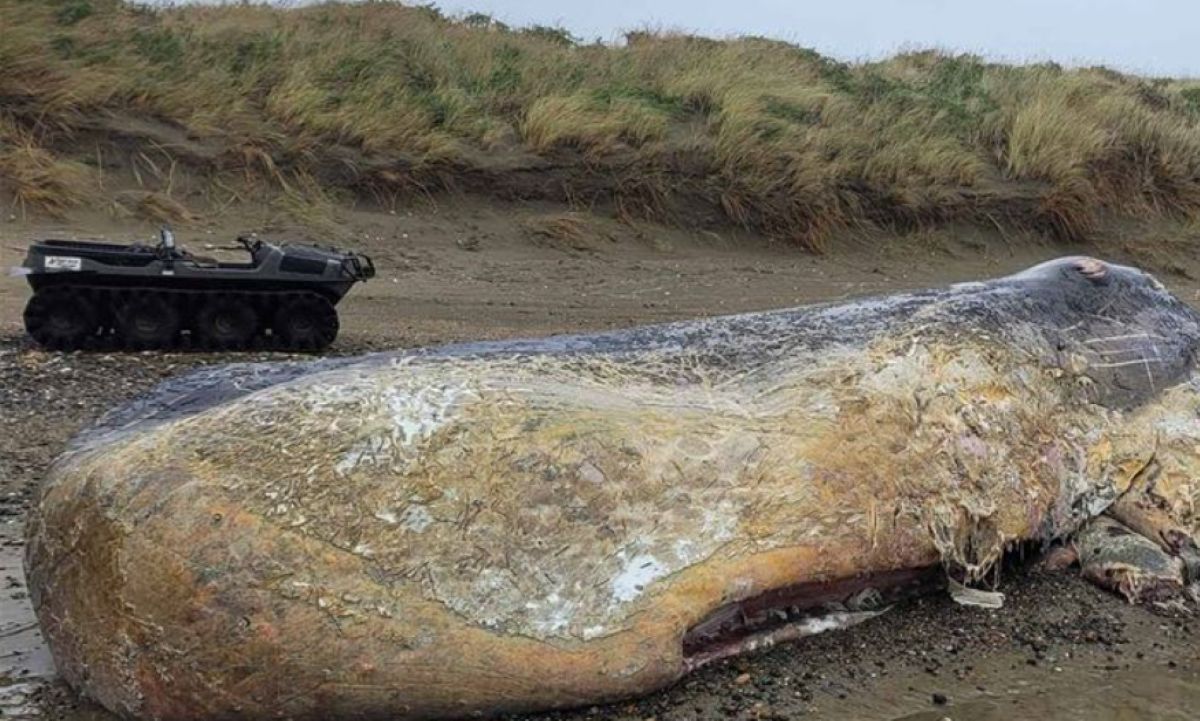Uncommon Knowledge
Newsweek is committed to challenging conventional wisdom and finding connections in the search for common ground.

A beached sperm whale has been found with its jawbone removed by a chainsaw in an upsetting incident in New Zealand, with locals condemning the damage done to one of their “chiefs of the sea.”
The near 50-foot sperm whale washed up on Oreti Beach, a remote area in Southland over the weekend. Marine mammal strandings are not uncommon, especially with sperm whales. However, there was something very strange about this one.
“Sometime between last Saturday and Monday, someone has come along with a chainsaw and taken the jawbone,” Rosalind Cole, a senior ranger the Department of Conservation said in a statement.
When a whale washes ashore, it provides an easy food source for a variety scavenging animals. However officials noticed tire tacks leading to the dead body as well as marks on the whale bone, the department reported. This clearly showed that the bone was removed by a human rather than another animal, the statement said.
Whale bones are a type of prized treasure, also known as taonga, to the Iwi, a social unit in the New Zealand Māori. However, removing the bones from an animal that has washed ashore is a criminal offense under the Marine Mammals Protection Act 1978, the department noted, and could result in a 250,000 New Zealand dollars ($150,000) fine.
Cole said in a statement that it was “disappointing” that the bone was stolen before officials had the chance to carry out the regular procedures.
Ōraka Aparima Kaumātua and Kai Rongoā Muriel Johnstone, local Iwi in the area, said that the situation was very upsetting.
“We know and treat whales as rangatira [chiefs] of the sea and as such deserve appropriate protocols said over them. This includes a farewell address and appropriate karakia [prayers]. This then allows us to treat the whale as a gift from the sea and use its resources. These include the bone, teeth and oils that we use as did our ancestors,” the statement said.
“We have experts at our rūnaka [assembly] who have worked with whales and their management. It is obvious that someone knows the value of these taonga and has deliberately removed and stolen the jaw.”
Sperm whales can strand for any number of reason, the most common being illness. The species can also become disorientated in certain waters, meaning they lose their ability to navigate and beach themselves as a result.
Officials will often try to help whales that strand while still alive. However, more often than not they are already dead. Their carcass is often left to decompose naturally as it provides a food source for other animals. However, it still remains off limits to members of the public.
It is not the first time someone has stolen a whale jaw from a stranded animal. This also happened at the same beach back in 2015, according to the Department of Conservation.
The department is still looking for information about the incident.
“Anyone with any information on the missing whale bone can contact the Department of Conservation on 0800 DOC HOT,” a statement read.
Do you have a tip on a science story that Newsweek should be covering? Do you have a question about whales? Let us know via science@newsweek.com.
Newsweek is committed to challenging conventional wisdom and finding connections in the search for common ground.
Newsweek is committed to challenging conventional wisdom and finding connections in the search for common ground.
